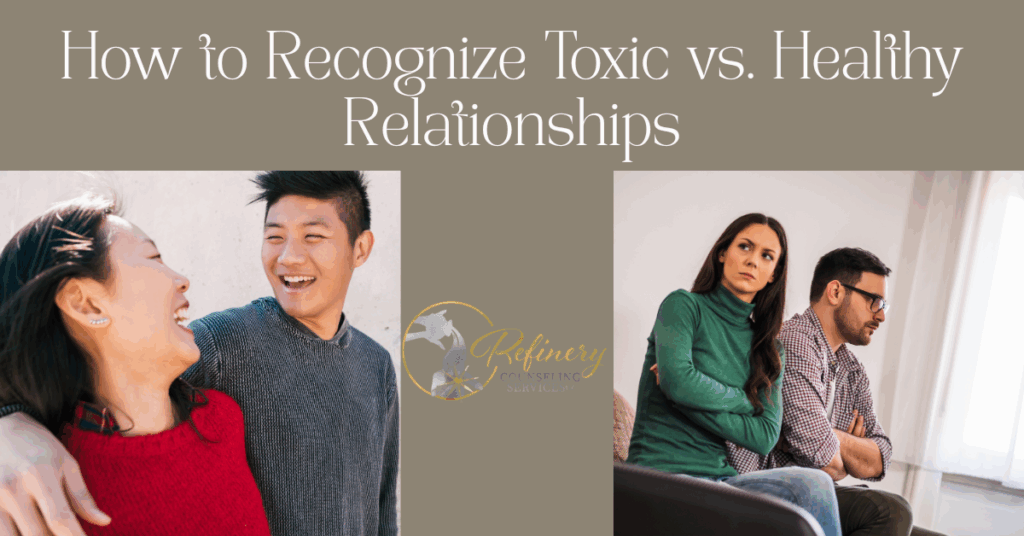Relationships form the foundation of our emotional well-being. Whether it’s with a spouse, family member, friend, colleague, or even ourselves, the quality of our connections directly impacts our mental health. But recognizing the difference between healthy and toxic dynamics isn’t always easy—especially when emotional attachment or history is involved.
At Refinery Counseling Services, we help clients navigate the complexities of relationships with wisdom, clarity, and compassion. In this article, we’ll explore the signs of both healthy and toxic relationships, the mental health effects of staying in harmful dynamics, and how to begin the journey toward healing and healthier connections.
What Defines a Healthy Relationship?
Healthy relationships are rooted in mutual respect, emotional safety, and honest communication. They don’t require perfection, but they do involve shared responsibility, compassion, and growth.
Key signs of a healthy relationship:
- Mutual respect: Both people value one another’s thoughts, boundaries, and individuality.
- Open communication: You feel safe expressing your feelings without fear of ridicule or retaliation.
- Support and encouragement: Your successes are celebrated, and your struggles are met with empathy.
- Healthy boundaries: You can say no without guilt, and space is respected.
- Conflict resolution: Disagreements are handled respectfully without manipulation or abuse.
Healthy relationships nourish emotional resilience. They don’t drain you—they help you grow. If you’re working on personal boundaries, Setting Boundaries Without Guilt offers strategies to build stronger, safer connections.
What Are the Signs of a Toxic Relationship?
Toxic relationships are emotionally destructive. They may not always involve physical harm, but they often include subtle and ongoing patterns of control, disrespect, and manipulation that wear down your self-worth.
Common red flags include:
- Constant criticism or belittling
- Gaslighting or denying your reality
- Emotional manipulation or guilt-tripping
- Controlling behaviors (where you go, who you talk to)
- Blame-shifting and lack of accountability
- Withholding affection or communication as punishment
- Walking on eggshells to avoid conflict
These patterns often lead to confusion, emotional fatigue, anxiety, and a loss of identity. If you constantly feel drained, unsafe, or diminished, it’s time to pause and reflect.
The Impact on Mental Health
Toxic relationships can profoundly affect your mental health. Prolonged exposure to emotional abuse or dysfunction may result in:
- Anxiety or panic attacks
- Depression or low self-esteem
- Difficulty sleeping or chronic fatigue
- Emotional numbness
- Isolation from friends and support networks
These symptoms often go unaddressed until they become unmanageable. That’s why early recognition is key. For guidance on identifying mental health symptoms, see How to Recognize Mental Health Symptoms Early — And What to Do Next.
Why It’s Hard to Walk Away
Leaving a toxic relationship isn’t always as simple as recognizing it. Emotional ties, shared history, children, or spiritual beliefs can make it incredibly difficult. Guilt, fear, or shame often keep people stuck.
Healing begins with self-compassion. Remind yourself:
- You deserve to feel safe, valued, and heard.
- God calls us to peace, not constant emotional turmoil (Romans 12:18).
- You are not responsible for fixing someone else’s dysfunction.
Counseling can provide a safe space to untangle these dynamics, process grief, and reclaim your voice.
Steps Toward Healing and Wholeness
If you’ve realized you’re in a toxic relationship, know that healing is possible. Here are the first steps:
- Acknowledge the reality. Journaling or speaking with a trusted therapist can help clarify what you’re experiencing.
- Reconnect with your values. What do you need to feel emotionally safe and supported?
- Set or reinforce boundaries. Even if the relationship continues, boundaries help protect your peace.
- Seek outside support. Talk to a counselor or join a support group for clarity and encouragement.
- Start the healing journey. Begin caring for your mind, body, and spirit again. Reclaim your identity outside the dysfunction.
Remember: therapy is not just for crisis. As we explored in Therapy Is Not Just for Crises: 5 Myths About Mental Health Support, counseling can be a proactive, empowering step toward emotional freedom.
Final Reflections
You were not created to endure relationships that deplete you. God designed us for connection that builds, not breaks; nurtures, not controls. Whether you’re in a relationship that needs redefining, rebuilding, or releasing, you are not alone.
At Refinery Counseling Services, we walk alongside individuals and families seeking healing, clarity, and healthier ways of relating. It takes courage to confront dysfunction. But your mental health, peace, and purpose are worth that bravery.

